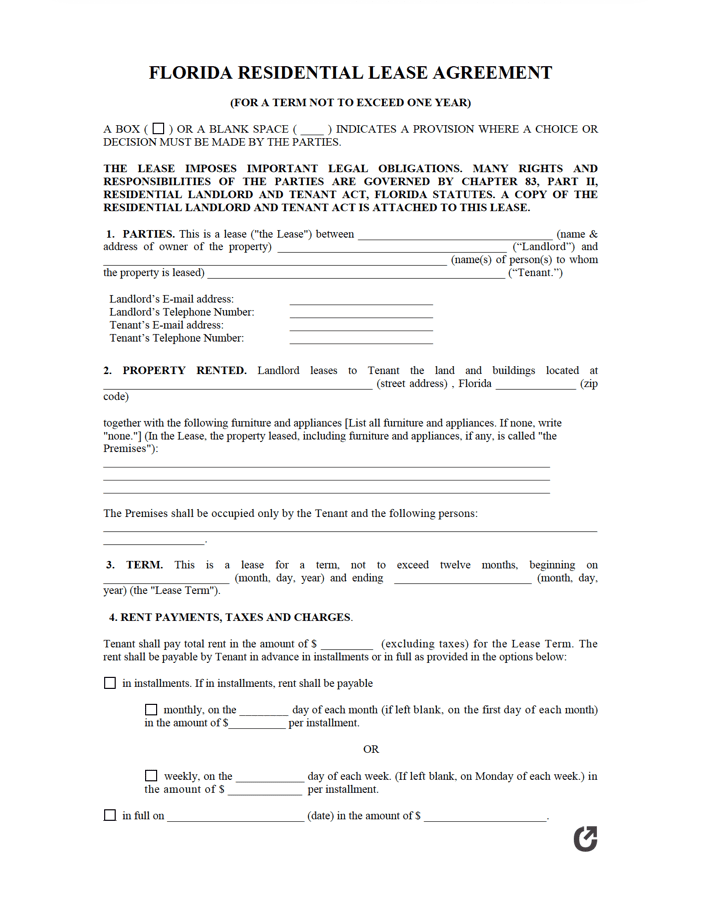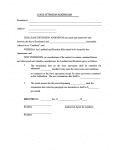Florida Rental Lease Agreement Templates
The Florida Lease Agreements are contracts that establish the rules and conditions regarding the renting of a residential or commercial property. The forms legally define the roles and responsibilities of both the landlord and tenant(s). The document is necessary to make it clear to each party in what they must do in order to uphold their obligations for the duration of the lease. Each document should include an area dedicated to party identification, the rules/conditions of the lease, the rent the tenant(s) are expected to pay, and the end date of the contract.
Types (6)
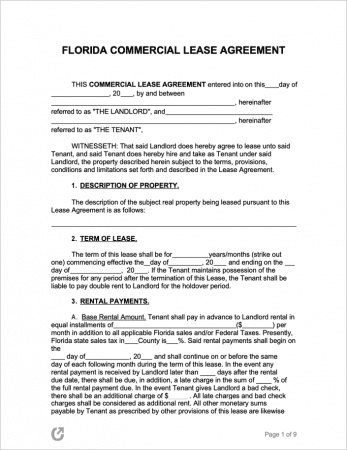 Commercial Lease Agreement – Appropriate for business owners wishing to rent out a property for the purpose of using it as their business premises.
Commercial Lease Agreement – Appropriate for business owners wishing to rent out a property for the purpose of using it as their business premises.
Download – Adobe PDF (.pdf), Word (.docx)
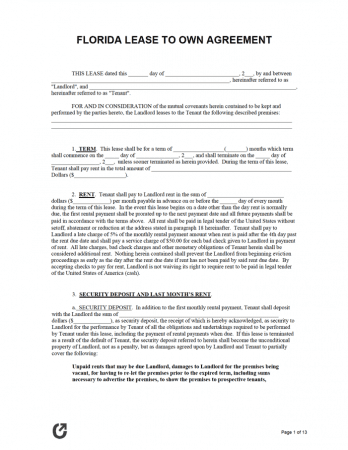 Lease to Own Agreement – Sets out specific conditions for a tenant to buy the property they lease from the landlord.
Lease to Own Agreement – Sets out specific conditions for a tenant to buy the property they lease from the landlord.
Download – Adobe PDF (.pdf), Word (.docx)
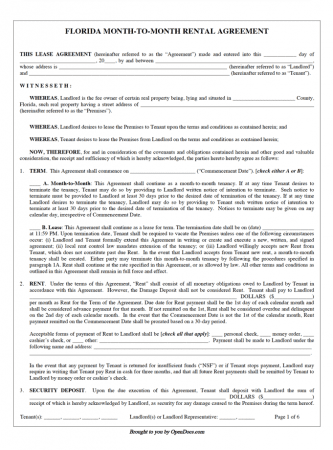 Month-to-Month Lease Agreement – This agreement permits tenancy to take place on a month-to-month basis for as long as both parties agree to such an arrangement.
Month-to-Month Lease Agreement – This agreement permits tenancy to take place on a month-to-month basis for as long as both parties agree to such an arrangement.
Download – Adobe PDF (.pdf), Word (.docx)
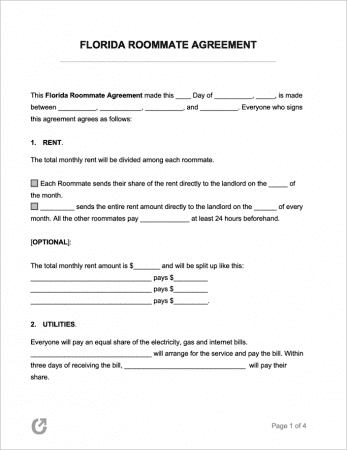 Roommate Agreement – A document designed to create a sense of harmony among individuals leasing rooms in the same rental property.
Roommate Agreement – A document designed to create a sense of harmony among individuals leasing rooms in the same rental property.
Download – Adobe PDF (.pdf), Word (.docx)
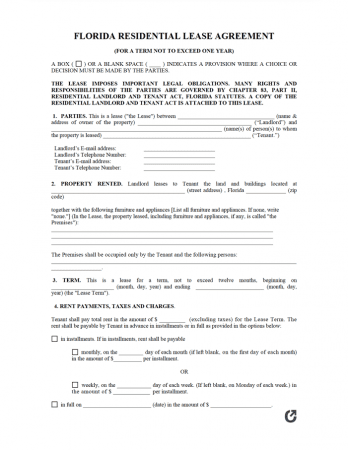 Standard Residential Lease Agreement – Used by landlords who wish to rent out their Florida-based property to one or many tenants.
Standard Residential Lease Agreement – Used by landlords who wish to rent out their Florida-based property to one or many tenants.
Download – Adobe PDF (.pdf)
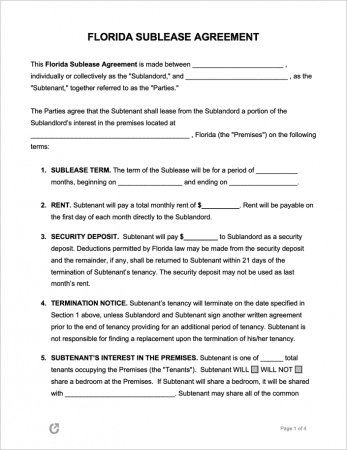 Sublease Agreement – Sets out provisions for a tenant to rent out their leased property to another party, usually with permission from the landlord.
Sublease Agreement – Sets out provisions for a tenant to rent out their leased property to another party, usually with permission from the landlord.
Download – Adobe PDF (.pdf), Word (.docx)
Addendums (3)
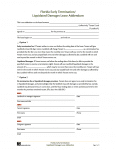 Addendum 1 – Early Termination (NOLO)
Addendum 1 – Early Termination (NOLO)
Download: Adobe PDF
Download: Adobe PDF
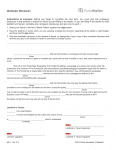 Addendum 3 – Nonlawyer Disclosure
Addendum 3 – Nonlawyer Disclosure
Download: Adobe PDF
What is a Florida Lease Agreement?
A Florida Lease Agreement is a legal document that outlines conditions for the rental of a residential property. Both the landlord and tenant have specific duties listed that they must follow. Landlords who wish to vet prospective tenants should using a rental application.
State Laws & Guides
- Laws: FL Statutes, Chapter 83 “Landlord and Tenant”
- Leasing Guide: Guide-to-Florida-Landlord-Tenant-Law.pdf
When is Rent Due?
According to § 83.46, rent is due at the beginning of each rent payment period, unless otherwise specified. There is no grace period required.
Landlord’s Access
- Emergency (§ 83.53(2(b))): Landlords can enter at any time in the event of an emergency,
- Non-Emergency (§ 83.53(2)): Landlords may enter in a range of circumstances, including inspecting the premises and making necessary or agreed repairs, decorations, alterations, or improvements. However, they must only enter between 7:30 a.m. and 8:00 p.m. and give “reasonable notice”; the standard being twelve (12) hours of notice.
Required Disclosures
- Fire Protection (§ 83.50): Landlords of buildings over three (3) stories high must notify tenants of the availability (or lack thereof) of any fire protection.
- Lead Paint Disclosure: In addition to attaching this pamphlet about lead paint hazards to a written lease, landlords must inform tenants of any lead paint hazards in properties built before 1978.
- Name and Address (§ 83.50): The name and address of the landlord or a person authorized to receive notices and demands on their behalf must be disclosed in writing.
- Radon Disclosure (§ 404.056): Every contract must include a specific statement about radon gas, as follows:
“RADON GAS: Radon is a naturally occurring radioactive gas that, when it has accumulated in a building in sufficient quantities, may present health risks to persons who are exposed to it over time. Levels of radon that exceed federal and state guidelines have been found in buildings in Florida. Additional information regarding radon and radon testing may be obtained from your county health department.”
Security Deposits
- Maximum: There is no statute regarding the maximum amount a landlord can require for a security deposit.
- Returning to Tenant (§ 83.49(3)(a)): Deposits must be returned within fifteen (15) days, unless there are necessary deductions to be made. In cases where the landlord wishes to claim the deposit, they must sent a written notice to the tenant by certified mail within thirty (30) days.
- Interest on Security Deposits (§ 83.49): Landlords are not required to collect interest on collected deposits, although the option is available to them. If the landlord does decide to collect store the deposit in an account that pays out interest, the security deposit must be kept within a Florida-based banking institution. The tenant will be owed one (1) of the following two (2), depending on the landlord’s preferences:
- Seventy-five percent (75%) of the annualized average interest rate, OR
- A simple five percent (5%) interest per year.
Prohibited Actions
- Lockouts (§ 83.67): Landlords cannot prevent tenants from accessing their rental units.
- Termination of Utilities: Landlords cannot interrupt or remove tenant’s utilities, of which include water, heat, gas, garbage removal services, electricity, elevators, and refrigeration, to name a few.
- Flags: Landlords cannot restrict the tenant’s right of flying a United States flag, so long it’s not larger than four (4) and half (1/2) feet by six (6) feet. Flags cannot invade other tenant’s space and the landlord is not responsible for any damages to the flag.
- Removal of Essential Property: Unless for maintenance, replacement, or repair, landlords are prohibited from removing exterior doors, the roof, walls, locks, and windows.
